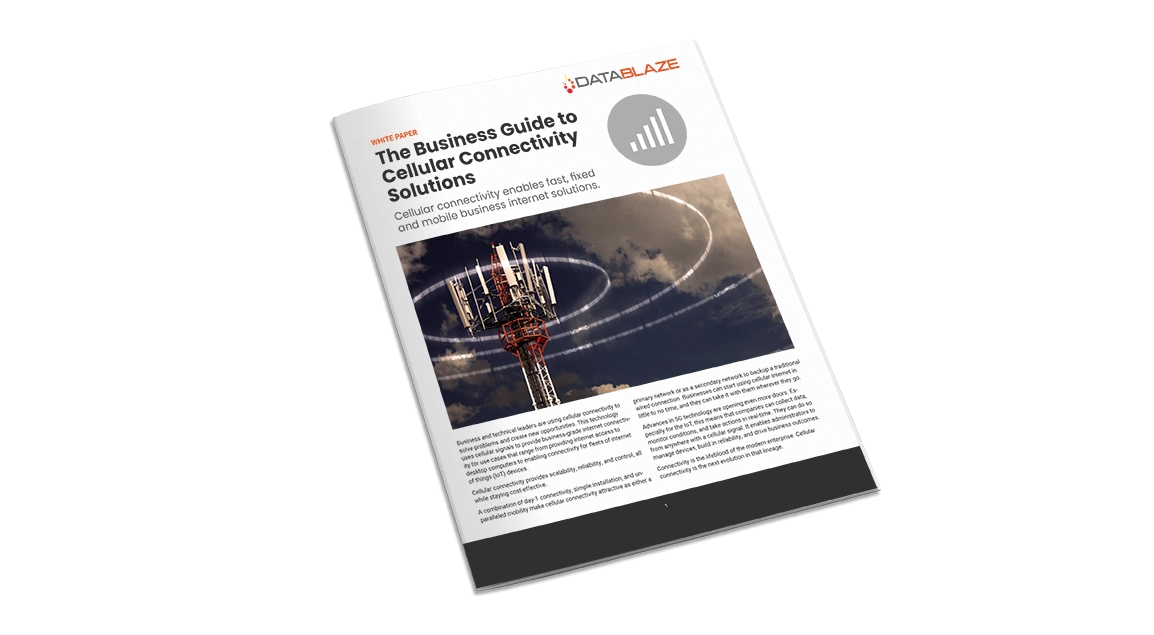Fixed Wireless Access (FWA) is a broadband connectivity solution that uses radio frequencies instead of cabling to transmit data. Essentially, FWA leverages cellular networks to provide high-speed internet access.
Although many FWA deployments use 4G LTE network connectivity, we’re seeing an evolution to 5G networks as more carriers expand their 5G coverage and offerings. While 4G LTE deployments are great for rural and remote areas that either don’t yet have 5G coverage or are impractical for 5G because of the technology’s limited range, organizations in urban areas and business facilities are seeing the benefits of adopting 5G FWA.
As carriers have built out their 5G networks over the past few years, more users have the option to use FWA to access high-speed internet. That means incredibly low latency, high bandwidth throughput, and high or unlimited data caps.
Today, dozens of major cities in the United States have comprehensive 5G FWA coverage. As 5G network coverage continues to expand, 5G FWA adoption will grow even further.
More Business Opportunities with 5G FWA
This technology will change business by providing more options for broadband internet access. Compared to cabled infrastructure, FWA is incredibly flexible and easy to install. This means that businesses can move to a new location and, whether or not the area has cabled broadband infrastructure, the organization can get up and running with a stable and reliable internet connection in next to no time.
5G FWA is also ideal for the modern enterprise with geographically dispersed yet digitally interconnected assets. For instance, a company can deploy internet of things (IoT) devices throughout a city with a 5G network and use FWA to facilitate and manage their connections to each other and to a centralized cloud platform.
Another unique facet of 5G FWA is that it provides a great connectivity option for businesses that operate in areas that cannot access a cabled network. For instance, FWA is currently being used in Penang, Malaysia in order to avoid having to dig trenches and run fiber cables in the UNESCO heritage city.
5G Fixed Wireless Access vs Cabled Broadband Internet
Cellular carriers are marketing FWA as a replacement for cable and fiber internet, both for businesses and residential users. Both options have their own pros and cons. Understanding them will help you to decide the right choice for you.
Pros of 5G Fixed Wireless Access:
- Flexibility
- Easy installation
- Broadband access in geographic areas that do not or cannot support cabled infrastructure
- High speeds
- Low latency
- High or unlimited data caps
- Simplified deployment and management of geographically dispersed assets
Cons of 5G Fixed Wireless Access:
- Limited range between base stations (cellular towers, 5G stations) and receiver units
- Some 5G technology is susceptible to environmental disruptions, such as weather, trees, and buildings
- Higher cost than cabled broadband
- Relatively new technology that still has room to grow
FWA has many advantages that can play to the strengths of certain organizations that need flexibility or greater coverage across a wide area. For businesses and residents in locations where cable or fiber isn’t available but who need a stable and reliable internet connection from a fixed location, FWA is a great option. If the business is in an area with excellent 4G LTE or 5G coverage, FWA can suffice as an all cellular broadband solution. Even if locations that do have wired internet access, FWA remains an ideal solution for backup internet or load balancing.
It’s also an ideal solution for businesses, such as construction or event companies, that continually operate out of different locations but still need a high-speed internet connection for their mobile phones, computers, and IoT devices.
Conclusion
By all measures, FWA adoption is rapidly growing. According to a report by T-Mobile, between Q4 2021 and Q3 2022 alone, the carrier added 1.7 million FWA customers. They expect that number to grow even further, writing that “T-Mobile and Verizon are expected to have 11 to 13 million total FWA customers by the end of 2025.”
Fixed wireless access is a solution that’s tailored to meet specific needs. It can serve as a backup or even a replacement for any wired broadband connection, but its main purpose is to fill in the gaps left by wired broadband. That means expanding coverage to more businesses and opening the door to greater flexibility.
For many organizations, a hybrid approach is the best option. Get in touch with Datablaze today to explore how you can use FWA to expand your operations, gain additional flexibility, and simplify remote asset management.



